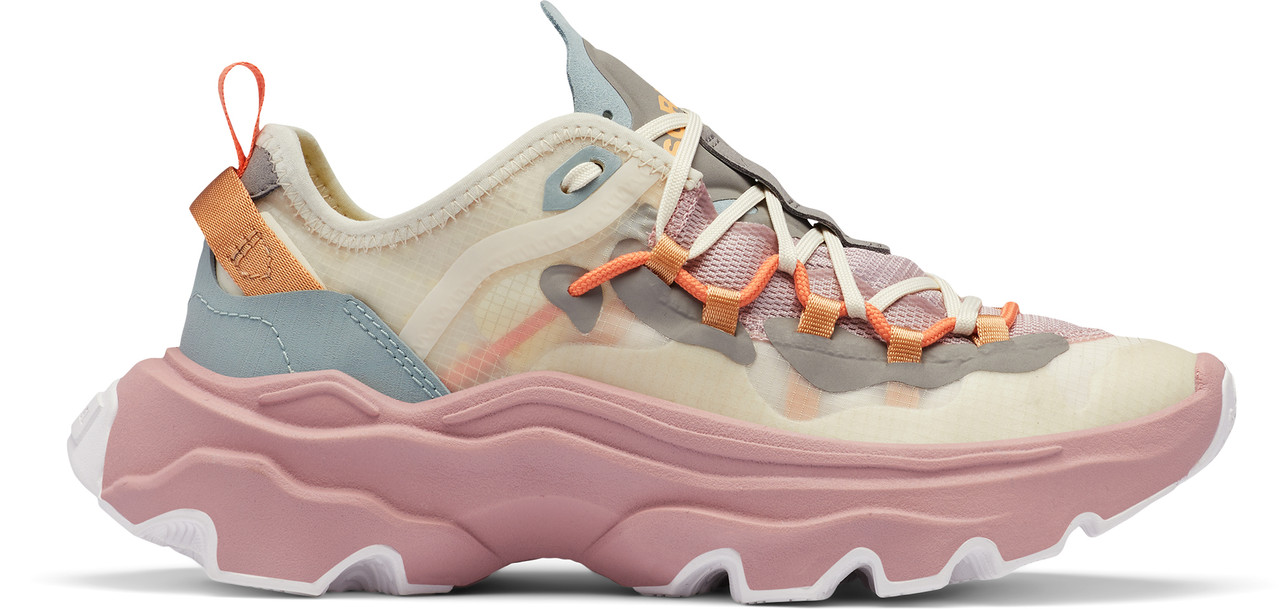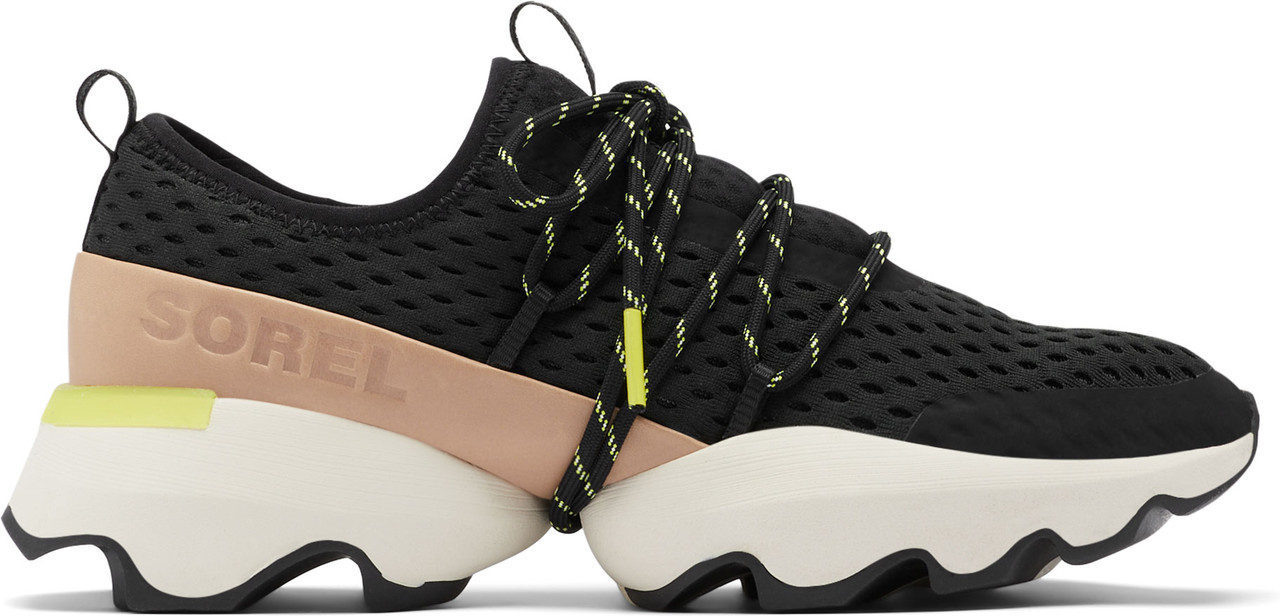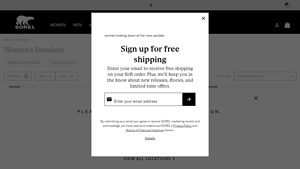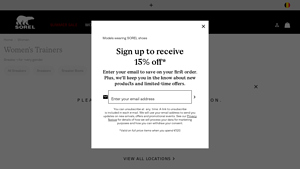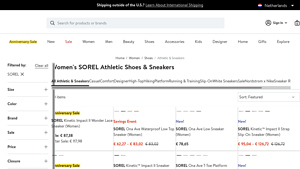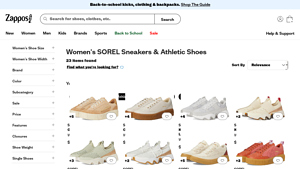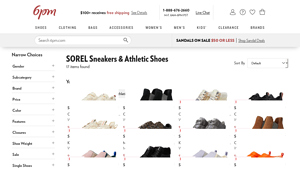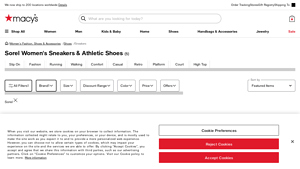Sorel Tennis Shoes Guide: Type,Cost,Material…
Introduction: Navigating the Global Market for sorel tennis shoes
In the dynamic landscape of global footwear markets, sourcing Sorel tennis shoes can present significant challenges for international B2B buyers. From navigating diverse consumer preferences to understanding local market trends, companies must stay ahead of the curve to ensure their product offerings resonate with target demographics. This guide serves as a comprehensive resource for stakeholders interested in Sorel tennis shoes, covering key aspects such as product types, applications, supplier vetting processes, and cost considerations.
With a focus on empowering decision-makers in regions like Africa, South America, the Middle East, and Europe—including markets like Nigeria and Germany—this guide aims to facilitate informed purchasing decisions. It provides actionable insights into sourcing strategies, enabling businesses to identify reliable suppliers and effectively meet the demands of their markets.
Furthermore, we delve into the latest trends in sneaker technology and style, ensuring that buyers are equipped with the knowledge to make competitive choices. By understanding the nuances of the Sorel brand and its offerings, buyers can enhance their product lines and ultimately drive sales. Join us as we explore the multifaceted world of Sorel tennis shoes and empower your business with the tools needed for successful procurement in this vibrant sector.
Understanding sorel tennis shoes Types and Variations
| Type Name | Key Distinguishing Features | Primary B2B Applications | Brief Pros & Cons for Buyers |
|---|---|---|---|
| KINETIC™ | Lightweight, flexible design with LIVELYFOAM™ technology | Retail, Sportswear, Fashion | Pros: Comfortable, stylish; Cons: Higher price point. |
| ONA™ | Classic look with waterproof options | Casual Wear, Outdoor Retail | Pros: Versatile styling; Cons: Limited color options. |
| OUT N ABOUT™ | Rugged outsole for enhanced traction and durability | Outdoor Activities, Workwear | Pros: Excellent grip; Cons: Bulkier design. |
| SOREL METRO™ | Urban-inspired design with a modern aesthetic | Fashion Retail, Urban Lifestyle | Pros: Trendy; Cons: May not be suitable for rugged use. |
| SCOUT N ABOUT™ | Lightweight construction with easy slip-on features | Casual Footwear, Everyday Use | Pros: Easy to wear; Cons: Less support for long walks. |
What Are the Key Characteristics of KINETIC™ Sorel Tennis Shoes?
KINETIC™ shoes stand out with their lightweight and flexible design, utilizing LIVELYFOAM™ technology for optimal comfort. This makes them ideal for buyers in retail and sportswear sectors where comfort and style are paramount. When considering B2B purchases, the KINETIC™ line appeals to retailers looking to attract consumers who prioritize modern aesthetics in their footwear choices, despite a higher price point that may limit accessibility for budget-conscious customers.
How Does the ONA™ Type Cater to Casual and Outdoor Needs?
The ONA™ series is characterized by its classic look and waterproof capabilities, making it suitable for both casual wear and outdoor retail applications. B2B buyers in regions with unpredictable weather can leverage this feature to offer consumers reliable options. While the versatility in styling is a significant advantage, buyers should note that the ONA™ line may have limited color choices, which could affect consumer appeal in diverse markets.
Why Choose OUT N ABOUT™ for Rugged Environments?
OUT N ABOUT™ shoes are designed with a rugged outsole that enhances traction and durability, making them perfect for outdoor activities and workwear applications. B2B buyers focused on outdoor retail will find these shoes appealing due to their performance in challenging environments. However, the bulkier design may not suit all consumers, particularly those seeking lightweight options for casual use.
What Makes SOREL METRO™ Attractive to Fashion Retailers?
The SOREL METRO™ line features an urban-inspired design that resonates with modern consumers. Its trendy aesthetic makes it an excellent choice for fashion retailers looking to cater to urban lifestyles. While the stylish appeal is a significant draw, B2B buyers should consider that these shoes may not perform well in rugged conditions, limiting their market to primarily urban settings.
How Does SCOUT N ABOUT™ Benefit Everyday Consumers?
SCOUT N ABOUT™ shoes boast a lightweight construction and easy slip-on features, making them ideal for everyday use and casual footwear applications. This makes them particularly attractive to B2B buyers in the casual footwear market. However, while they are convenient, the lack of support for long walks could deter customers who prioritize comfort for extensive wear.
Key Industrial Applications of sorel tennis shoes
| Industry/Sector | Specific Application of sorel tennis shoes | Value/Benefit for the Business | Key Sourcing Considerations for this Application |
|---|---|---|---|
| Retail and E-commerce | Selling fashionable sneakers for urban lifestyle consumers | Appeals to trend-conscious customers, driving sales | Supplier reliability, shipping costs, and inventory management |
| Hospitality and Tourism | Providing staff with comfortable, stylish footwear | Enhances employee comfort and brand image | Durability, ease of maintenance, and uniformity in styles |
| Outdoor and Adventure Sports | Offering performance footwear for recreational activities | Attracts outdoor enthusiasts and boosts brand loyalty | Waterproof features, grip, and support for diverse terrains |
| Health and Wellness | Utilizing sneakers in wellness programs and fitness centers | Encourages physical activity and customer engagement | Comfort, style, and versatility for various fitness activities |
| Corporate and Office Wear | Implementing smart-casual footwear in office environments | Promotes a professional yet relaxed workplace culture | Style, comfort, and adaptability to formal and casual settings |
How Are Sorel Tennis Shoes Used in Retail and E-commerce?
In the retail and e-commerce sector, Sorel tennis shoes are marketed as stylish and functional footwear that appeals to urban consumers. Retailers can leverage the shoes’ trendy designs and comfort features to attract a demographic that values both aesthetics and practicality. This application helps businesses capitalize on fashion trends, thereby increasing sales and customer loyalty. International buyers should consider supplier reliability and shipping costs to ensure timely stock replenishment.
What Role Do Sorel Tennis Shoes Play in Hospitality and Tourism?
In the hospitality and tourism industry, Sorel tennis shoes are utilized to provide staff with comfortable yet fashionable footwear. This enhances employee satisfaction and contributes positively to the brand image, as staff can represent the establishment while remaining comfortable during long shifts. Buyers in this sector must focus on the durability and ease of maintenance of the shoes, ensuring that they can withstand daily wear and tear while maintaining a polished appearance.
Why Are Sorel Tennis Shoes Important for Outdoor and Adventure Sports?
Sorel tennis shoes find a significant application in the outdoor and adventure sports sector, where performance footwear is essential for recreational activities. These shoes offer features such as waterproofing and excellent grip, making them ideal for various terrains. Businesses in this industry can attract outdoor enthusiasts and build brand loyalty by providing high-quality footwear. Key considerations for sourcing include the shoes’ ability to perform under diverse conditions and their overall support for outdoor activities.
How Can Sorel Tennis Shoes Enhance Health and Wellness Programs?
In health and wellness sectors, Sorel tennis shoes are incorporated into fitness programs and wellness initiatives. Their comfort and style encourage participants to engage in physical activities, making them a popular choice in gyms and fitness centers. For B2B buyers, sourcing shoes that offer versatility and comfort is crucial, as they cater to a wide range of fitness activities, from casual workouts to intensive training sessions.
How Do Sorel Tennis Shoes Fit into Corporate and Office Wear?
Sorel tennis shoes are increasingly being adopted in corporate environments as part of a smart-casual dress code. This application promotes a relaxed workplace culture while maintaining professionalism. Businesses must consider sourcing shoes that balance style and comfort, enabling employees to transition seamlessly between formal and casual settings. This flexibility can enhance employee morale and productivity, making it an attractive option for modern workplaces.
3 Common User Pain Points for ‘sorel tennis shoes’ & Their Solutions
Scenario 1: Sizing and Fit Challenges for International Orders
The Problem: B2B buyers often encounter difficulties with sizing and fit when purchasing Sorel tennis shoes for international markets. The inconsistency in sizing standards across different regions can lead to confusion, resulting in a higher rate of returns and exchanges. Buyers may worry about the implications of sizing errors, such as the potential loss of customer trust and increased operational costs associated with managing returns.
The Solution: To mitigate sizing issues, it is crucial for buyers to familiarize themselves with Sorel’s specific sizing charts, which can vary between styles. When placing bulk orders, consider conducting a survey or gathering data from your target market about their usual sizes in athletic footwear. This can provide insights into what sizes are most commonly purchased, allowing for more accurate ordering. Additionally, establishing a partnership with local distributors or retailers can facilitate the testing of samples before committing to larger orders. This proactive approach can significantly reduce the likelihood of sizing-related problems.
Scenario 2: Limited Product Availability and Stock Issues
The Problem: B2B buyers may face challenges with the availability of specific Sorel tennis shoe models, particularly during peak seasons or promotional events. Limited stock can hinder the ability to meet consumer demand, leading to lost sales opportunities and dissatisfied customers. This scenario is particularly concerning for businesses in regions where Sorel’s brand presence is growing, and competition is fierce.
The Solution: To navigate stock limitations, buyers should establish a direct line of communication with Sorel’s sales representatives or authorized distributors. Regularly scheduled check-ins can provide insights into upcoming stock availability and potential new releases. Additionally, consider placing advance orders or utilizing Sorel’s pre-order options for anticipated high-demand styles. This strategy ensures that your inventory aligns with customer demand and enables you to capitalize on market trends without missing out on sales.
Scenario 3: Performance and Durability Concerns for Diverse Climates
The Problem: In regions with varying climates, B2B buyers often worry about the performance and durability of Sorel tennis shoes under different environmental conditions. For example, buyers in humid or wet climates may question the effectiveness of waterproof features, while those in colder regions might be concerned about insulation and grip on icy surfaces. This apprehension can lead to hesitancy in purchasing decisions.
The Solution: To address performance concerns, buyers should thoroughly review the product specifications and technologies employed in Sorel tennis shoes. Highlighting features such as EVERTREAD™ for traction and LIVELYFOAM™ for comfort can reassure potential customers about their suitability for different climates. Additionally, conducting product demonstrations or offering trials can allow customers to experience the shoes’ performance firsthand. Providing comprehensive product care information, such as cleaning and maintenance tips, can further enhance the perceived value and longevity of the shoes, ensuring that buyers feel confident in their investment.
Strategic Material Selection Guide for sorel tennis shoes
When selecting materials for Sorel tennis shoes, several factors come into play, including performance, durability, cost, and regional compliance standards. Below is an analysis of four common materials used in the production of Sorel tennis shoes, focusing on their properties, advantages, disadvantages, and specific considerations for international B2B buyers.
What Are the Key Properties of Rubber in Sorel Tennis Shoes?
Rubber is a primary material used in the outsoles of Sorel tennis shoes. It offers excellent traction and flexibility, making it suitable for various terrains. Its temperature resistance can range from -40°F to 140°F, ensuring performance in diverse climates.
Pros: Rubber is highly durable and provides excellent grip, which is essential for athletic footwear. It is also relatively inexpensive, making it a cost-effective choice for manufacturers.
Cons: While rubber is durable, it can degrade under extreme UV exposure, leading to cracking over time. Additionally, its manufacturing process can be complex, requiring careful handling to ensure quality.
Impact on Application: Rubber outsoles are compatible with various surfaces, including asphalt and grass, making them versatile for different sports.
Considerations for International Buyers: Compliance with ASTM standards for slip resistance is crucial, particularly in regions with varying weather conditions like Africa and Europe. Buyers should also consider the sourcing of rubber, as sustainable practices are increasingly important in the global market.
How Does Synthetic Leather Enhance Sorel Tennis Shoes?
Synthetic leather is commonly used in the upper part of Sorel tennis shoes. It mimics the look and feel of genuine leather while offering enhanced durability and water resistance.
Pros: Synthetic leather is lightweight, easy to clean, and resistant to moisture, making it ideal for outdoor use. It is also less expensive than genuine leather, which can help lower production costs.
Cons: While synthetic leather is durable, it may not offer the same breathability as natural leather, which can affect comfort during prolonged wear. Additionally, it can be less environmentally friendly if not sourced from recycled materials.
Impact on Application: This material is suitable for various weather conditions, providing both style and functionality.
Considerations for International Buyers: Buyers from Europe, particularly Germany, may prioritize materials that comply with REACH regulations, which restrict harmful substances in textiles.
What Role Does EVA Foam Play in Comfort and Performance?
EVA (Ethylene Vinyl Acetate) foam is frequently used in the midsoles of Sorel tennis shoes, providing cushioning and support.
Pros: EVA foam is lightweight, flexible, and offers excellent shock absorption, enhancing comfort during physical activities. It is also relatively inexpensive, making it a popular choice for manufacturers.
Cons: While EVA foam is durable, it can compress over time, leading to a decrease in cushioning performance. Additionally, it is less resistant to extreme temperatures compared to other materials.
Impact on Application: The cushioning provided by EVA foam is beneficial for activities that require prolonged standing or walking, making it suitable for casual wear.
Considerations for International Buyers: Compliance with international standards for cushioning materials is essential, particularly for markets in Africa and South America, where comfort is a significant purchasing factor.
How Does Waterproof Technology Affect Material Selection?
Waterproof materials, such as Gore-Tex or proprietary waterproof membranes, are often integrated into Sorel tennis shoes to enhance their functionality in wet conditions.
Pros: Waterproof technology keeps feet dry in adverse weather, making these shoes suitable for outdoor activities. This feature can significantly enhance the shoe’s marketability in regions with heavy rainfall.
Cons: The incorporation of waterproof membranes can increase production costs and may require more complex manufacturing processes. Additionally, some waterproof materials may reduce breathability.
Impact on Application: Waterproof shoes are particularly beneficial in regions with high humidity or frequent rain, ensuring that wearers remain comfortable and dry.
Considerations for International Buyers: Compliance with international waterproof standards, such as ISO 811, is critical for buyers in Europe and the Middle East, where quality assurance is paramount.
| Material | Typical Use Case for sorel tennis shoes | Key Advantage | Key Disadvantage/Limitation | Relative Cost (Low/Med/High) |
|---|---|---|---|---|
| Rubber | Outsoles | Excellent traction and durability | Degrades under UV exposure | Low |
| Synthetic Leather | Uppers | Lightweight and water-resistant | Less breathable than natural leather | Medium |
| EVA Foam | Midsoles | Lightweight and shock-absorbing | Compresses over time | Low |
| Waterproof Membrane | Overall shoe construction | Keeps feet dry in wet conditions | Increases production complexity | High |
This analysis provides valuable insights for B2B buyers looking to source Sorel tennis shoes, highlighting the importance of material selection in relation to performance, cost, and compliance with regional standards.
In-depth Look: Manufacturing Processes and Quality Assurance for sorel tennis shoes
What Are the Main Stages of Manufacturing Sorel Tennis Shoes?
The manufacturing process for Sorel tennis shoes involves several critical stages that ensure the final product meets quality and performance standards. Here’s a detailed look at these stages:
Material Preparation
The first stage in the manufacturing process is the careful selection and preparation of raw materials. Sorel emphasizes the use of high-quality materials such as leather, synthetic fibers, rubber, and specialized foam technologies. Each material is chosen for its durability, comfort, and performance characteristics.
During this phase, materials undergo various treatments, including waterproofing and abrasion resistance, which are essential for enhancing the longevity and functionality of the shoes. This preparation phase also includes cutting the materials into specific shapes and sizes required for different shoe components.
Forming
Once materials are prepared, the next step is forming. This involves creating the shoe components, such as the upper, lining, and sole. Advanced techniques like injection molding and die-cutting are commonly used to ensure precision and consistency in each component.
For Sorel, the forming stage is crucial as it sets the foundation for comfort and fit. Technologies such as BREATHEFREE and LIVELYFOAM are integrated during this stage to enhance breathability and cushioning, respectively. These innovations contribute to a better user experience and differentiate Sorel’s offerings in a competitive market.
Assembly
The assembly process combines the formed components into a complete shoe. Skilled workers use both manual and automated methods to stitch, bond, and secure each part together. This stage is essential for ensuring that all components fit seamlessly, providing the desired aesthetic and functional characteristics.
Sorel emphasizes meticulous attention to detail during assembly to maintain high standards of craftsmanship. This includes ensuring that seams are reinforced and that the shoes are built to withstand various environmental conditions, particularly for outdoor use.
Finishing
The final stage in the manufacturing process is finishing. This includes quality checks, cleaning, and applying any final treatments such as waterproofing or polishing. Finishing touches also involve adding branding elements and packaging the shoes for distribution.
During this stage, Sorel ensures that each pair of shoes meets its stringent quality standards before they reach the market. This attention to detail helps maintain the brand’s reputation for producing durable and stylish footwear.
What Quality Assurance Standards Are Relevant for Sorel Tennis Shoes?
Quality assurance is a fundamental aspect of Sorel’s manufacturing process. To ensure the highest standards are met, Sorel adheres to several international and industry-specific quality standards.
International Standards: ISO 9001
ISO 9001 is a widely recognized quality management standard that outlines criteria for establishing an effective quality management system. Compliance with ISO 9001 ensures that Sorel maintains consistent product quality and customer satisfaction. This standard also emphasizes continuous improvement, which aligns with Sorel’s commitment to innovation in their products.
Industry-Specific Standards: CE Marking
For products sold in Europe, the CE marking indicates compliance with health, safety, and environmental protection standards. Sorel’s adherence to CE standards ensures that their tennis shoes meet the rigorous safety requirements expected in the European market. This is particularly relevant for B2B buyers in Europe, as it signifies product reliability and safety.
How Are Quality Control Checkpoints Structured in the Manufacturing Process?
Quality control (QC) is integrated throughout Sorel’s manufacturing process, employing various checkpoints to ensure adherence to quality standards. Key QC checkpoints include:
Incoming Quality Control (IQC)
IQC involves inspecting the raw materials upon arrival at the manufacturing facility. This step ensures that only high-quality materials are used in production. Incoming materials are assessed for compliance with predefined specifications, reducing the likelihood of defects in the final product.
In-Process Quality Control (IPQC)
During the manufacturing process, IPQC is conducted at various stages to monitor the production line. This includes checking the accuracy of cutting, the integrity of stitching, and the overall assembly quality. IPQC helps identify any issues early in the manufacturing process, allowing for immediate corrective actions.
Final Quality Control (FQC)
FQC is the last checkpoint before the products are shipped. This step involves a comprehensive inspection of the finished shoes to verify that they meet Sorel’s quality standards. FQC includes checking for aesthetic defects, functional performance, and adherence to safety standards.
What Testing Methods Are Commonly Used for Quality Assurance in Sorel Tennis Shoes?
To ensure their products meet high-quality standards, Sorel employs various testing methods, including:
- Durability Testing: Shoes are subjected to wear and tear simulations to assess their longevity under different conditions.
- Waterproof Testing: This evaluates the effectiveness of waterproofing treatments, ensuring that the shoes perform well in wet conditions.
- Comfort Testing: Assessments are conducted to evaluate cushioning and support, ensuring the shoes provide a comfortable fit for extended wear.
How Can B2B Buyers Verify Supplier Quality Control Practices?
For international B2B buyers, particularly in regions like Africa, South America, the Middle East, and Europe, verifying supplier QC practices is essential for ensuring product quality. Here are some actionable steps:
Conduct Audits
Buyers should consider conducting on-site audits of the manufacturing facilities. This allows them to assess the processes, materials, and quality control systems in place. Audits can provide valuable insights into the supplier’s commitment to quality.
Request Quality Reports
Suppliers should be able to provide quality assurance reports that detail their compliance with international standards and internal quality checks. These reports can help buyers understand the supplier’s quality management practices.
Engage Third-Party Inspections
Utilizing third-party inspection services can provide an unbiased assessment of the supplier’s quality control processes. These inspections can occur at various stages of production and provide additional assurance regarding product quality.
What Are the Nuances of Quality Control for International B2B Buyers?
Understanding the nuances of quality control is vital for international B2B buyers. Different regions may have varying standards and regulations. For example, buyers in Europe may require CE marking, while those in Africa might focus on local compliance certifications.
Additionally, language barriers and cultural differences can impact communication regarding quality expectations. Establishing clear, written agreements on quality standards and expectations can help mitigate these challenges.
In conclusion, Sorel’s comprehensive manufacturing processes and robust quality assurance practices ensure that their tennis shoes meet the highest standards of quality and performance. By understanding these processes, B2B buyers can make informed purchasing decisions and establish reliable partnerships with suppliers.
Practical Sourcing Guide: A Step-by-Step Checklist for ‘sorel tennis shoes’
In this sourcing guide, we provide a step-by-step checklist designed for B2B buyers interested in procuring SOREL tennis shoes. This guide aims to streamline the purchasing process, ensuring that buyers make informed decisions and secure the best products for their business needs.
Step 1: Identify Your Target Market
Understanding your target market is essential to sourcing the right products. Consider demographics such as age, gender, and lifestyle preferences, particularly in regions like Africa, South America, the Middle East, and Europe. Tailoring your selection to fit market demands can enhance sales and customer satisfaction.
Step 2: Define Your Technical Specifications
Before reaching out to suppliers, clearly outline the specifications of the SOREL tennis shoes you wish to procure. This includes sizing, color options, waterproof features, and technology (e.g., LIVELYFOAM™ or EVERTREAD™). Having a well-defined specification helps suppliers provide accurate quotes and ensures product quality aligns with your expectations.
Step 3: Evaluate Potential Suppliers
Thoroughly vet potential suppliers to ensure they meet your quality and reliability standards. Request company profiles, product samples, and references from other buyers, especially those in your target regions. Look for suppliers with a proven track record in delivering high-quality footwear and excellent customer service.
Step 4: Verify Compliance with Import Regulations
Ensure that the suppliers comply with international import regulations, particularly if you are sourcing from outside your region. This includes checking for certifications such as ISO standards and compliance with local safety regulations. Non-compliance can lead to delays, fines, or even confiscation of goods.
Step 5: Negotiate Terms and Pricing
Once you have shortlisted suppliers, engage in negotiations regarding pricing, payment terms, and delivery schedules. Understand the market price range for SOREL tennis shoes to ensure you secure a competitive deal. Also, inquire about bulk purchase discounts, which can significantly reduce costs.
Step 6: Request Samples for Quality Assurance
Before finalizing any orders, request samples of the shoes to assess their quality firsthand. This step is critical in evaluating the materials, craftsmanship, and overall fit of the shoes. Testing samples can prevent costly mistakes and ensure that the final products meet your quality standards.
Step 7: Establish a Logistics Plan
Develop a logistics plan to manage the shipment and distribution of the SOREL tennis shoes. Consider shipping methods, potential delays at customs, and warehousing options. A well-thought-out logistics strategy can streamline your supply chain and enhance customer satisfaction by ensuring timely deliveries.
By following this checklist, B2B buyers can navigate the procurement process for SOREL tennis shoes more effectively, ensuring they make informed decisions that align with their business objectives.
Comprehensive Cost and Pricing Analysis for sorel tennis shoes Sourcing
What Are the Key Cost Components for Sorel Tennis Shoes?
When sourcing Sorel tennis shoes, understanding the cost structure is crucial for B2B buyers. The main cost components include:
-
Materials: High-quality materials such as waterproof fabrics, durable soles, and breathable linings contribute significantly to the cost. Sorel emphasizes innovative technologies like LIVELYFOAM™ and EVERTREAD™, which can increase material costs but enhance product performance.
-
Labor: Labor costs vary by region. Countries with higher wage standards may lead to increased production costs. It’s essential to consider the labor intensity of the manufacturing process, which can differ based on the complexity of the shoe design.
-
Manufacturing Overhead: This encompasses all operational costs associated with production facilities, including utilities, equipment maintenance, and facility management. Efficient manufacturing processes can help mitigate these costs.
-
Tooling: Custom tooling for specific designs or features can be a significant upfront investment. Buyers should evaluate the need for unique designs versus standard offerings to manage costs effectively.
-
Quality Control (QC): Implementing rigorous QC measures ensures product reliability and compliance with international standards. This can add to the overall cost but is vital for maintaining brand integrity.
-
Logistics: Shipping and distribution expenses vary by destination and can be impacted by factors such as freight rates, customs duties, and delivery timelines. Choosing the right Incoterms is crucial for managing these costs effectively.
-
Margin: Suppliers will include a profit margin in their pricing. Understanding the average market margins can aid in negotiations and help set realistic expectations.
How Do Price Influencers Affect Sorel Tennis Shoes Sourcing?
Several factors can influence the pricing of Sorel tennis shoes in the B2B market:
-
Volume and Minimum Order Quantity (MOQ): Higher order volumes typically lead to lower per-unit costs. Negotiating favorable MOQs can be beneficial for budget-conscious buyers.
-
Specifications and Customization: Customization requests can significantly impact pricing. Buyers should assess whether standard models meet their needs to avoid unnecessary costs.
-
Materials and Quality Certifications: Sourcing shoes with specific quality certifications (e.g., waterproofing standards) may increase costs but can be essential for meeting customer expectations in various markets.
-
Supplier Factors: The choice of supplier can greatly affect pricing. Established suppliers with a good reputation may command higher prices, while emerging suppliers might offer competitive rates.
-
Incoterms: Understanding shipping terms and responsibilities can affect the total landed cost. For instance, choosing DDP (Delivered Duty Paid) can simplify logistics but may come at a premium.
What Are the Best Buyer Tips for Cost Efficiency in Sorel Tennis Shoes Sourcing?
For international B2B buyers, particularly in regions like Africa, South America, the Middle East, and Europe, considering the following tips can lead to more cost-effective sourcing:
-
Negotiation: Always be prepared to negotiate terms and pricing. Building a long-term relationship with suppliers can lead to better deals over time.
-
Total Cost of Ownership (TCO): Evaluate the TCO, which includes not just the purchase price but also logistics, customs, and storage costs. This holistic view can uncover hidden expenses.
-
Pricing Nuances for International Markets: Be aware of regional pricing strategies. Economic conditions, currency fluctuations, and import tariffs can all influence final costs. For instance, prices in Nigeria may vary compared to those in Germany due to differing market dynamics.
-
Research and Benchmarking: Conduct thorough market research to understand competitive pricing. Benchmarking against similar products can provide leverage during negotiations.
-
Supplier Diversification: Avoid reliance on a single supplier. Diversifying your supplier base can enhance bargaining power and mitigate risks associated with supply chain disruptions.
Disclaimer on Indicative Prices
Prices for Sorel tennis shoes can vary significantly based on the factors mentioned above. It is advisable for buyers to conduct their own research and obtain quotes from multiple suppliers to ensure they are receiving competitive pricing tailored to their specific needs.
Alternatives Analysis: Comparing sorel tennis shoes With Other Solutions
Understanding Alternatives in Footwear Solutions
When considering footwear solutions for various business needs, it’s crucial to evaluate alternatives that can meet specific performance criteria, cost-effectiveness, and user satisfaction. Sorel tennis shoes, known for their stylish designs and practical features, compete with other footwear options in the marketplace. This analysis compares Sorel tennis shoes with two viable alternatives: Adidas Ultraboost and Nike Air Max. Both alternatives are popular in the athletic and casual footwear segments, making them relevant comparisons.
Comparison Table
| Comparison Aspect | Sorel Tennis Shoes | Adidas Ultraboost | Nike Air Max |
|---|---|---|---|
| Performance | Excellent traction, waterproof options | Superior cushioning, responsive | Good support, air cushioning |
| Cost | $90 – $145 | $150 – $250 | $130 – $200 |
| Ease of Implementation | Easy to integrate into casual/work settings | Versatile for sports and casual | Suitable for various activities |
| Maintenance | Low maintenance; machine washable | Moderate; requires careful cleaning | Moderate; sensitive to dirt |
| Best Use Case | Casual wear, light outdoor activities | Running, everyday wear | Fashion-forward casual wear |
Detailed Breakdown of Alternatives
Adidas Ultraboost
Adidas Ultraboost shoes are renowned for their responsive cushioning and energy return technology, making them an excellent choice for both athletic and casual wear. Their performance excels in running and high-impact activities due to the Boost midsole, which absorbs shock effectively. However, this performance comes at a higher price point, ranging from $150 to $250, which may not be suitable for all budget-conscious businesses. The shoes also require moderate maintenance as they can be sensitive to dirt and moisture, necessitating careful cleaning to maintain their aesthetic appeal.
Nike Air Max
Nike Air Max shoes are a staple in the footwear industry, blending style and functionality. They offer good support and air cushioning, making them comfortable for prolonged wear. The price range of $130 to $200 makes them a more accessible option compared to the Ultraboost. However, while they are versatile for various activities, their maintenance can be moderate, as the visible air units can attract dirt and require regular cleaning to keep them looking fresh. The Nike Air Max is particularly suited for fashion-forward individuals looking to make a style statement while enjoying comfort.
How to Choose the Right Footwear Solution
When selecting the right footwear for your business needs, consider the specific requirements of your target market. For companies focusing on casual and outdoor activities, Sorel tennis shoes present a compelling option due to their waterproof features and stylish designs. However, if your target demographic leans towards athletic performance, Adidas Ultraboost or Nike Air Max may provide the necessary support and cushioning. Assess factors like cost, maintenance, and the intended use case to make an informed decision that aligns with your business goals and customer expectations. Ultimately, understanding the strengths and weaknesses of each option will empower B2B buyers to choose footwear solutions that best meet their needs.
Essential Technical Properties and Trade Terminology for sorel tennis shoes
What Are the Essential Technical Properties of Sorel Tennis Shoes?
When considering Sorel tennis shoes for your business, understanding the essential technical properties is crucial. Here are several critical specifications that define the quality and performance of these products:
-
Material Grade
Sorel tennis shoes typically utilize high-grade synthetic materials and textiles that enhance durability and comfort. Materials like EVA (Ethylene Vinyl Acetate) and rubber are common, providing flexibility and excellent grip. For B2B buyers, selecting shoes made from quality materials ensures longevity and customer satisfaction, reducing return rates and enhancing brand reputation. -
Waterproof Technology
Many Sorel models incorporate waterproof features, utilizing advanced membranes and treatments to keep feet dry in various conditions. This is particularly important for markets in regions with wet climates or for consumers engaging in outdoor activities. Buyers should assess the waterproof rating and technology to ensure the product meets regional demands and consumer expectations. -
Comfort and Cushioning Systems
Sorel tennis shoes often feature proprietary cushioning technologies like LIVELYFOAM™ and STEADYSOLE™. These systems are designed to provide superior comfort, shock absorption, and support during extended wear. In B2B transactions, emphasizing comfort can be a key selling point, as it directly influences repeat purchases and customer loyalty. -
Sizing and Fit Tolerances
Precision in sizing is critical in footwear. Sorel shoes are designed with specific fit tolerances that cater to different foot shapes, ensuring a snug fit. For B2B buyers, understanding these tolerances helps in making informed decisions about inventory management and customer fit, minimizing returns due to sizing issues. -
Heel Height and Design Specifications
The heel height and overall design of Sorel tennis shoes vary across collections, impacting style and functionality. Products range from low to mid-heel heights, accommodating different consumer preferences. B2B buyers should consider market trends and regional style preferences when selecting inventory. -
Sustainability Practices
Increasingly, Sorel integrates sustainable practices into their manufacturing processes, using recycled materials and environmentally friendly production methods. B2B buyers should prioritize sustainability in their purchasing decisions, as consumers are increasingly looking for eco-friendly options, which can enhance brand loyalty and appeal to a broader market.
Which Trade Terms Should B2B Buyers Understand When Purchasing Sorel Tennis Shoes?
Navigating the procurement process requires familiarity with specific trade terminology. Here are some common terms relevant to sourcing Sorel tennis shoes:
-
OEM (Original Equipment Manufacturer)
An OEM refers to a company that produces parts or equipment that may be marketed by another manufacturer. In the context of Sorel shoes, understanding OEM relationships can provide insights into product quality and manufacturing practices, which are vital for building trust with suppliers. -
MOQ (Minimum Order Quantity)
MOQ denotes the smallest quantity of a product that a supplier is willing to sell. For B2B buyers, knowing the MOQ helps in budgeting and inventory planning, ensuring that orders align with sales forecasts and operational needs. -
RFQ (Request for Quotation)
An RFQ is a document sent to suppliers requesting pricing and terms for specific products. B2B buyers should use RFQs to gather competitive pricing and evaluate supplier capabilities, ensuring that they make informed purchasing decisions. -
Incoterms (International Commercial Terms)
Incoterms define the responsibilities of buyers and sellers in international transactions. Familiarity with terms like FOB (Free on Board) or CIF (Cost, Insurance, and Freight) can help B2B buyers manage logistics and understand cost implications in shipping Sorel shoes from manufacturers. -
Lead Time
Lead time refers to the time taken from placing an order to delivery. Understanding lead times is essential for B2B buyers to manage their supply chain effectively and ensure product availability aligns with market demand. -
Return Policy
Knowing the return policy of suppliers is crucial for B2B transactions, as it determines how returns are handled in case of defective products or mismatched orders. A clear return policy can significantly impact the buyer’s risk management and overall satisfaction with their procurement process.
By grasping these technical properties and trade terms, B2B buyers can make well-informed decisions when sourcing Sorel tennis shoes, ensuring they meet market demands and customer expectations effectively.
Navigating Market Dynamics and Sourcing Trends in the sorel tennis shoes Sector
What Are the Current Market Dynamics and Key Trends Impacting Sorel Tennis Shoes?
The global market for athletic and casual footwear, particularly Sorel tennis shoes, is experiencing significant growth driven by several factors. The increasing demand for stylish yet functional footwear is being propelled by changing consumer lifestyles, with an emphasis on both aesthetics and performance. This trend is particularly notable in regions like Africa and South America, where urbanization and a growing middle class are leading to heightened disposable income and a willingness to invest in quality footwear.
Emerging technologies are also reshaping the sourcing landscape. The rise of e-commerce platforms and mobile shopping apps has made it easier for international buyers to access a wider range of products, including Sorel’s innovative offerings. B2B buyers should focus on leveraging data analytics to understand consumer preferences and optimize inventory management. Furthermore, sustainability is becoming a core consideration, with buyers increasingly seeking brands that offer eco-friendly options, such as Sorel’s waterproof sneakers made with sustainable materials.
Internationally, buyers from regions like Europe are particularly influenced by trends in sustainability and ethical sourcing. The demand for products that not only meet fashion standards but also align with environmental and social governance (ESG) criteria is rising. Therefore, B2B buyers must stay abreast of market dynamics that highlight the importance of ethical sourcing and transparency in supply chains.
How Important Is Sustainability and Ethical Sourcing for Sorel Tennis Shoes?
Sustainability and ethical sourcing are increasingly critical for B2B buyers in the Sorel tennis shoes sector. The environmental impact of footwear production, particularly regarding materials and manufacturing processes, has come under scrutiny. Sorel is responding to this challenge by incorporating sustainable practices, such as using recycled materials and minimizing waste in their production lines.
Ethical supply chains are not just a trend; they are becoming a necessity for maintaining brand reputation and consumer loyalty. Buyers should look for certifications like the Global Organic Textile Standard (GOTS) or the Responsible Down Standard (RDS) that signal a commitment to sustainability. Sorel’s adoption of innovative materials, such as LIVELYFOAM™ and EVERTREAD™, not only enhances product performance but also aligns with eco-conscious consumer expectations.
Incorporating these sustainable practices into sourcing strategies can enhance a company’s market position and appeal to a growing demographic of environmentally conscious consumers. As such, B2B buyers should prioritize partnerships with manufacturers who demonstrate a commitment to sustainability and ethical sourcing.
What Is the Brief Evolution of Sorel Tennis Shoes and Its Relevance to B2B Buyers?
Sorel, originally known for its rugged winter boots, has successfully evolved into a versatile footwear brand that caters to both casual and athletic markets. Established in 1962, the brand has expanded its product range to include stylish sneakers that resonate with modern consumers. This evolution reflects a broader trend in the footwear industry towards multifunctionality and adaptability.
For B2B buyers, understanding this evolution is crucial. It highlights Sorel’s ability to innovate and adapt to changing market demands, making it a reliable partner for those looking to stock trendy, high-quality footwear. As the brand continues to integrate advanced technologies and sustainable practices into its product lines, it positions itself as a leader in the competitive footwear landscape, offering significant value to international buyers from diverse regions. By aligning with a brand that prioritizes innovation and sustainability, B2B buyers can enhance their offerings and meet the evolving preferences of their customers.
Frequently Asked Questions (FAQs) for B2B Buyers of sorel tennis shoes
-
How can I source Sorel tennis shoes for my business?
To source Sorel tennis shoes effectively, start by identifying authorized distributors or wholesalers in your region. You can contact Sorel directly through their official website for a list of certified suppliers. Additionally, consider attending trade shows focused on footwear or fashion, where you can connect with representatives and get firsthand information about product availability, pricing, and terms. -
What are the minimum order quantities (MOQs) for Sorel tennis shoes?
Minimum order quantities can vary based on the supplier and specific product lines. Generally, MOQs for branded footwear like Sorel may range from 50 to 200 pairs per style. It’s best to negotiate with suppliers to understand their requirements and explore options for smaller initial orders, especially if you are testing the market in your region. -
What payment terms should I expect when ordering Sorel shoes?
Payment terms can differ between suppliers, but common practices include a 30% deposit upfront with the balance due upon delivery or a net 30-day payment term post-invoice. For international transactions, it is advisable to use secure payment methods such as letters of credit or escrow services to mitigate risks. Always clarify payment terms before finalizing any order. -
How can I ensure the quality of Sorel tennis shoes I receive?
To ensure product quality, request samples from your supplier before placing a large order. Establish quality assurance standards and communicate them clearly to your supplier. Additionally, consider conducting third-party inspections during production and before shipment to verify that the products meet your specifications and quality expectations. -
What is the best way to handle logistics for international shipping of Sorel tennis shoes?
When managing logistics for international shipping, partner with a reliable freight forwarder experienced in footwear transport. Discuss shipping methods (air vs. sea), customs clearance procedures, and potential tariffs. Ensure that you have a clear understanding of the lead times and delivery schedules to maintain inventory levels effectively. -
Can I customize Sorel tennis shoes for my brand?
Customization options for Sorel shoes may be limited, as they are a branded product. However, you can inquire about private labeling or specific colorways that might be available through the supplier. If significant customization is needed, consider discussing collaborative opportunities directly with Sorel, as they may offer specific programs for B2B partners. -
What are the typical lead times for ordering Sorel tennis shoes?
Lead times can vary based on the order size, production schedules, and shipping methods. Generally, you can expect lead times of 4 to 12 weeks for international orders. It’s advisable to plan ahead and communicate with your supplier to get accurate timelines based on your specific order and shipping destination. -
How can I vet suppliers for Sorel tennis shoes?
To vet suppliers effectively, conduct thorough research by checking their business credentials, customer reviews, and trade references. Request product samples to assess quality and reliability. Additionally, consider their responsiveness and communication style, as these factors can indicate their professionalism and willingness to support your business needs.
Important Disclaimer & Terms of Use
⚠️ Important Disclaimer
The information provided in this guide, including content regarding manufacturers, technical specifications, and market analysis, is for informational and educational purposes only. It does not constitute professional procurement advice, financial advice, or legal advice.
While we have made every effort to ensure the accuracy and timeliness of the information, we are not responsible for any errors, omissions, or outdated information. Market conditions, company details, and technical standards are subject to change.
B2B buyers must conduct their own independent and thorough due diligence before making any purchasing decisions. This includes contacting suppliers directly, verifying certifications, requesting samples, and seeking professional consultation. The risk of relying on any information in this guide is borne solely by the reader.
Top 6 Sorel Tennis Shoes Manufacturers & Suppliers List
1. SOREL – Women’s Fashionable Sneakers
Domain: sorel.com
Registered: 1997 (28 years)
Introduction: Women’s Fashionable Sneakers from SOREL, featuring various styles including ONA AVE™ and KINETIC™ collections. Prices range from $90 to $135. Available sizes from 5 to 12. Color options include Beige, Black, Brown, Green, Grey, Pink, White, and Yellow. Some models are waterproof and include technologies like BREATHEFREE, EVERTREAD™, LIVELYFOAM™, and STEADYSOLE™. Free standard shipping on orders ov…
2. Sorel Footwear – Premium Lux Sneakers
Domain: sorelfootwear.be
Registered: 2010 (15 years)
Introduction: This company, Sorel Footwear – Premium Lux Sneakers, is a notable entity in the market. For specific product details, it is recommended to visit their website directly.
3. SOREL – Women’s Athletic Shoes
Domain: nordstrom.com
Registered: 1994 (31 years)
Introduction: This company, SOREL – Women’s Athletic Shoes, is a notable entity in the market. For specific product details, it is recommended to visit their website directly.
4. SOREL – Women’s Sneakers & Athletic Shoes
Domain: zappos.com
Registered: 1999 (26 years)
Introduction: This company, SOREL – Women’s Sneakers & Athletic Shoes, is a notable entity in the market. For specific product details, it is recommended to visit their website directly.
5. 6pm – Discounted Fashion
Domain: 6pm.com
Registered: 2004 (21 years)
Introduction: This company, 6pm – Discounted Fashion, is a notable entity in the market. For specific product details, it is recommended to visit their website directly.
6. Sorel – Women’s Sneakers & Athletic Shoes
Domain: macys.com
Registered: 1994 (31 years)
Introduction: Sorel Women’s Sneakers & Athletic Shoes available at Macy’s. Various discounts and deals including up to 60% off on select items. The collection includes a range of styles suitable for athletic and casual wear.
Strategic Sourcing Conclusion and Outlook for sorel tennis shoes
In navigating the competitive landscape of sourcing Sorel tennis shoes, B2B buyers are presented with unique opportunities to capitalize on a brand synonymous with quality and innovation. By understanding the diverse product offerings, including waterproof options and advanced technologies like LIVELYFOAM™ and EVERTREAD™, buyers can effectively cater to varying consumer preferences across regions.
Strategic sourcing is crucial not just for cost efficiency but also for ensuring alignment with market trends and customer expectations. By leveraging insights into regional demands, such as the growing interest in fashionable yet functional footwear in markets like Nigeria and Germany, international buyers can make informed purchasing decisions that enhance their market positioning.
Looking ahead, the demand for Sorel tennis shoes is likely to continue its upward trajectory, driven by evolving fashion sensibilities and an increased focus on sustainability. Buyers are encouraged to engage with suppliers proactively, explore partnership opportunities, and stay abreast of new product launches to optimize their inventory strategies. Seize the moment to enhance your product offerings and establish a strong foothold in this dynamic footwear market.
